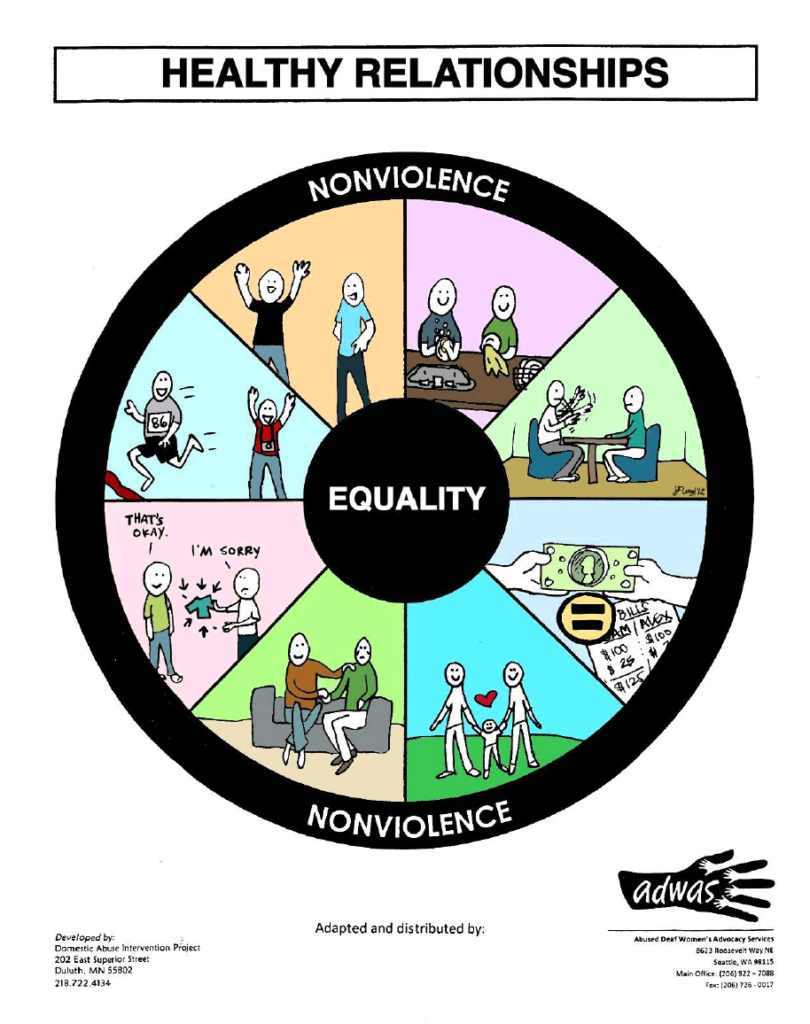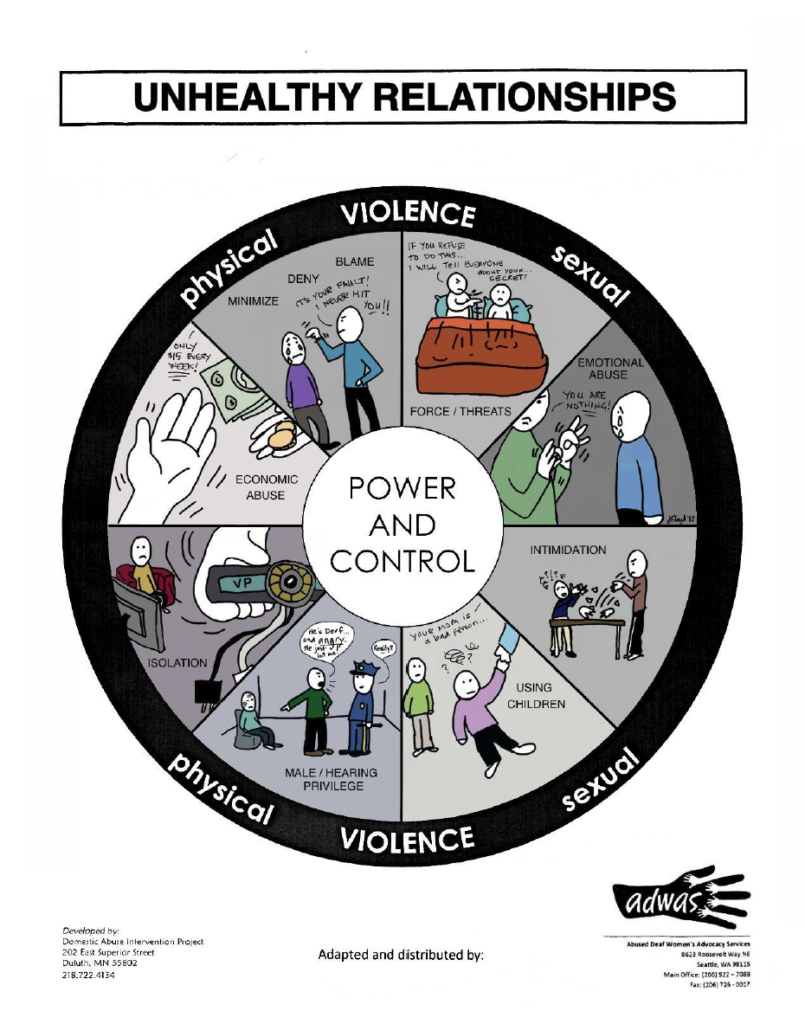What is abuse?
Domestic violence (also called intimate partner violence (IPV), domestic abuse or relationship abuse) is a pattern of behaviors or coercive control in an intimate relationship that is used by one person to gain or maintain power and control over the other partner.
Common Tactics of Power and Control
Often domestic violence can be subtle and can happen slowly in a relationship. Abusive partners gain or maintain power and control in many ways, which can include behaviors that intimidate, manipulate, humiliate, isolate, frighten, terrorize, coerce, threaten, blame, hurt or injure someone. The more the survivor tries to pull away from the relationship, the more the abusive partner tries to gain and maintain power and control, often in more dangerous ways.
Anyone Can Be Abused, and the Abuse is Not the Fault of the Victim
Domestic violence can happen to anyone regardless of their class, religion, ethnic background, education, age, gender, disability status, sexual orientation, gender presentation or immigration status. Sometimes individuals being abused blame themselves for the abuse that is happening to them, but nothing that a person says or does justifies their partner’s use of violence.
Abuse in the Deaf Community
Data from an eight-year survey of college students at Rochester Institute of Technology indicates that Deaf and hard of hearing individuals are 1.5 times more likely to be victims of relationship violence including sexual harassment, sexual assault, psychological abuse and physical abuse in their lifetime.
Deaf victims of domestic violence often face unique circumstances:
- Information can travel quickly within a Deaf, DeafBlind or hard of hearing community, compromising confidentiality and the victim’s safety.
- Law enforcement and shelters are often not skilled at communicating with Deaf, DeafBlind or hard of hearing individuals and often don’t have interpreters.
- Their abusive partners may take away their communication devices.
- Their abusive partners may give false information to the victim to make them believe they have fewer options.
- The victim may be isolated from family, friends, services, resources and options.
According to DeafHope these are some examples of what victims face and the tactics abusive partners use to abuse the Deaf:
- Intimidation through gestures, facial expressions, or exaggerated signs, floor stomping and pounding on the table or door.
- Signing very close to a victim’s face when angry.
- Criticizing the victim’s American Sign Language (ASL) skills or communication style.
- Not informing the victim when people try to call on the phone or try to catch their attention.
- Excluding the victim from important conversations.
- Leaving the victim out in social situations with hearing people.
- Talking negatively about the Deaf community.
- Wrongly interpreting to manipulate the situation if the police are called.
- Not allowing children to use ASL to talk with the victim.
- Not allowing children to be proud of Deaf culture.
- Criticizing the victim’s speech and English skills.
Safety Planning
Create a safety plan
Safety planning is an important process for each survivor. There are ideas for safety planning in many scenarios, including while in a relationship, after leaving, and if you experience stalking. Your personal safety plan will change over time and depending on the situation. Your safety plan should include your children. Consider your safety at work, at home, and anywhere else you may go. You may contact an advocate at BRIDGES or the National Deaf Hotline for assistance with creating your safety plan.
How to help a friend or family member
Are you concerned that someone you care about is experiencing abuse? Does your friend or family member…
- Turn down social invitations or miss work or social engagements often?
- Seem more withdrawn or isolated or seem to have lost confidence?
- Become anxious or unusually quiet when their partner is around?
- Have unexplained injuries or injuries that do not fit the explanation for how they happened?
- Wear unusually heavy make-up or cover up by dressing heavily for the season?
- Receive an unusually high number of calls or text messages from their partner?
- Have to “check-in” with their partner?
- Seem sensitive about home life or hint about trouble at home?
- Have a partner who publicly degrades them or uses verbal put downs?
What to say
We often keep silent because we don’t want to intrude on someone’s personal life or we don’t know what to say. Victims often say they kept silent because no one asked them about the abuse. Here are some practical tips for how to talk with someone you care about. The most important thing is to be a non-judgmental source of comfort and support.
- Start the conversation by saying “I care about you,” or “I am worried about your safety.”
- Point out specific behaviors or incidents that concern you. For example, “I saw your partner grab your arm very hard and march you across the room.”
- Don’t make blaming or shaming statements, like “Why don’t you just leave?” or “I would never let someone put their hands on me.”
- Don’t give advice. Instead say, “What do you think you should do?” or “You are the one who knows your situation best.”
- Remain calm. If you react strongly and insist that your friend or family member call the police immediately, they may shut down.
- Offer to help connect them with resources. Let them know that calling a domestic violence program (commonly referred to as a “shelter”) does not mean they have to go to shelter or leave their partner unless they choose to. A domestic violence program can help them create a plan for leaving an abusive relationship safely.
- This person may not be ready to leave the relationship. Don’t pressure them to leave, even if you don’t understand. Escaping an abusive relationship can be extremely dangerous. Say, “I will be here for you no matter what you decide.”
- Don’t push printed materials on your friend or family member; these can be found by the abusive partner and can increase the victim’s danger.
Please contact us at BRIDGES to talk about your concerns and questions for your friend or family member.

